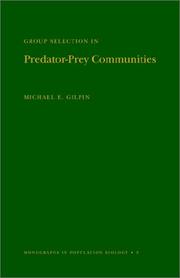| Listing 1 - 1 of 1 |
Sort by
|

ISBN: 0691081573 0691081611 0691209464 Year: 1975 Publisher: Princeton (N.J.) : Princeton university press,
Abstract | Keywords | Export | Availability | Bookmark
 Loading...
Loading...Choose an application
- Reference Manager
- EndNote
- RefWorks (Direct export to RefWorks)
Many animals regulate their population density by patterns of behavior that would be easy to explain if the forces of natural selection acted to optimize group properties. But Darwinian selection acts on individuals, not groups, and most simple theories have shown group selection to be too slow ever to oppose individual selection successfully.In this book Michael Gilpin presents a model, based on predator-prey dynamics, wherein nonlinear effects are important, so that small advantages to the selfish individual are nonlinearly amplified into disaster for his group. The result is that group selection can be rapid and powerful. Of course many instances of apparent group selection can be explained by kin selection; in other cases, close examination reveals that seemingly altruistic behavior directly benefits the individual genotype as well as the group. The value of the monograph is that it provides a robust model in which group selection, pure and unadulterated, can be seen to work.
Group selection (Evolution) --- Predation (Biology) --- Mathematical models. --- Populationsekologi. --- evolution. --- Group selection. --- Communities, Predator-prey --- Dynamics, Predator-prey --- Interactions, Predator-prey --- Predator-prey communities --- Predator-prey dynamics --- Predator-prey interactions --- Predator-prey relations --- Predator-prey relationships --- Predator-prey systems --- Predators and prey --- Predatory behavior (Biology) --- Predatory-prey relationships --- Prey and predators --- Prey-predator relationships --- Preying (Biology) --- Relations, Predator-prey --- Relationships, Predator-prey --- Systems, Predator-prey --- Animal ecology --- Animals --- Parasitism --- Evolution (Biology) --- Population biology --- Philosophy --- Creation --- Emergence (Philosophy) --- Teleology --- Food --- Garr-Saunders, A. M. --- Gilpin, M. E. --- Levins, R. --- MacArthur, R. H. --- Maynard Smith, J. --- Plague system. --- Rosenzweig, M. L. --- Totentanz system. --- Watt, K. E. F. --- Wynne-Edwards, V. C. --- aggression. --- dominance: ecological. --- fitness. --- gene flow. --- interference. --- limit cycles. --- optimal population density. --- predator migration. --- self-stabilization. --- sensitivity analysis. --- sexual reproduction. --- territoriality. --- yellow fever. --- zero isocline/isosurface.
| Listing 1 - 1 of 1 |
Sort by
|

 Search
Search Feedback
Feedback About UniCat
About UniCat  Help
Help News
News